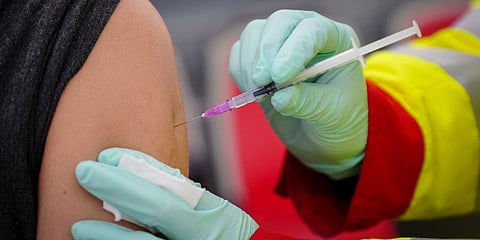

CHENNAI: Amid fears of a third wave spurred by the highly-transmissible Omicron variant of the coronavirus, the Tamil Nadu Health Department on Monday issued an updated triage and treatment protocol for Covid-19 patients.
Significantly, the protocol, revised after seven months, takes vaccination status of patients into consideration for triage.
This comes after cases spiked in TN, with 1,728 being reported on Monday, and the number of active cases reaching 10,364. Health Secretary J Radhakrishnan, writing to district collectors and others, instructed them to ensure the 1.15 lakh beds available for Covid treatment are fully functional.
According to the new treatment guidelines, Covid-19 positive pregnant and lactating mothers as well as patients aged over 60 should be referred to dedicated Covid hospitals.
Similarly, those with a family history of severe Covid-19 or death due to Covid should be referred to higher centres for care.
The government advises against prophylactic use of steroids and says irrational use of antibiotics in Covid should be avoided.
Among medications prescribed for patients, depending on their condition, are paracetamol for fever or myalgia, with steroids and anticoagulents to be given if the patient’s oxygen saturation level drops below 94.
‘If not vaxxed, patients over 40 with comorbidities must be admitted’
All patients are advised to take folic acid. The protocol makes no mention of drugs such as Remdesivir or Tocilizumab, demand for which rose to a frenzy during the second wave.
According to the new guidelines, unvaccinated patients with comorbidities must be admitted in Covid Care Centre (CCC) and observed for at least five days.
Unvaccinated patients with no comorbidities and no symptoms will be observed in home isolation. Patients must undergo a complete haemogram, random blood sugar test, CRP test and X-ray.
RT PCR need not be repeated but all unvaccinated contacts of positive patients and all persons who are symptomatic must undergo RT PCR testing for Covid.
Patients above 40 years with comorbidities, who are either unvaccinated or partially vaccinated, and those who tested negative but are symptomatic with oxygen saturation below 90 should be admitted to dedicated Covid hospitals, while others may be admitted at CCCs or Covid Health Centres depending on age, comorbidities and vaccine status.
Those who tested negative but have clinical, lab and radiological parameters suggesting Covid, with RR and oxygen level less than 30 and 90 respectively should be admitted to Covid designated hospitals.
People who tested negative but have RR and oxygen level less than 24 and 94 respectively may be sent for home quarantine.
Those in home isolation are also advised to ensure adequate hydration, practice prone position and monitor temperature and oxygen saturation levels every six hours.
They should seek hospital care if red flags appear.
These include persistent fever not responding to medication for more than five days or persistent cough or breathlessness or fatigability or if oxygen level drops below 94 by more than two percent during observation or if respiratory rate (RR) is 24-30 per minute.
These people should seek care at Covid Health Centres (CHC) to get assessed for further treatment.
They may call 104 for admission at CHCs if low oxygen saturation persists below 92, or if RR is less than 30. At CHCs, doctors are advised to do relevant blood tests and chest x-ray, if available and monitor capillary blood glucose, plasma glucose, urine ketones, for known diabetes.
If oxygen saturation falls below 94, CHCs are advised to start oxygen, steroid and low molecular weight heparin.
CHC also advised not to start anticoagulants for a patient with a history of bleeding disorders and platelet count is less than one lakh per microliter and refer to Covid hospitals.
‘Check Sugar levels ’
CHCs are advised to transfer the patients to district headquarters hospitals or the concerned referral hospitals if two consecutive values of random blood sugar, six hours apart, are more than 300mg or if urine ketone is positive irrespective of blood sugar level.
If the patient is not improving and saturation falls below 90 then it is advised they are referred to Covid hospital